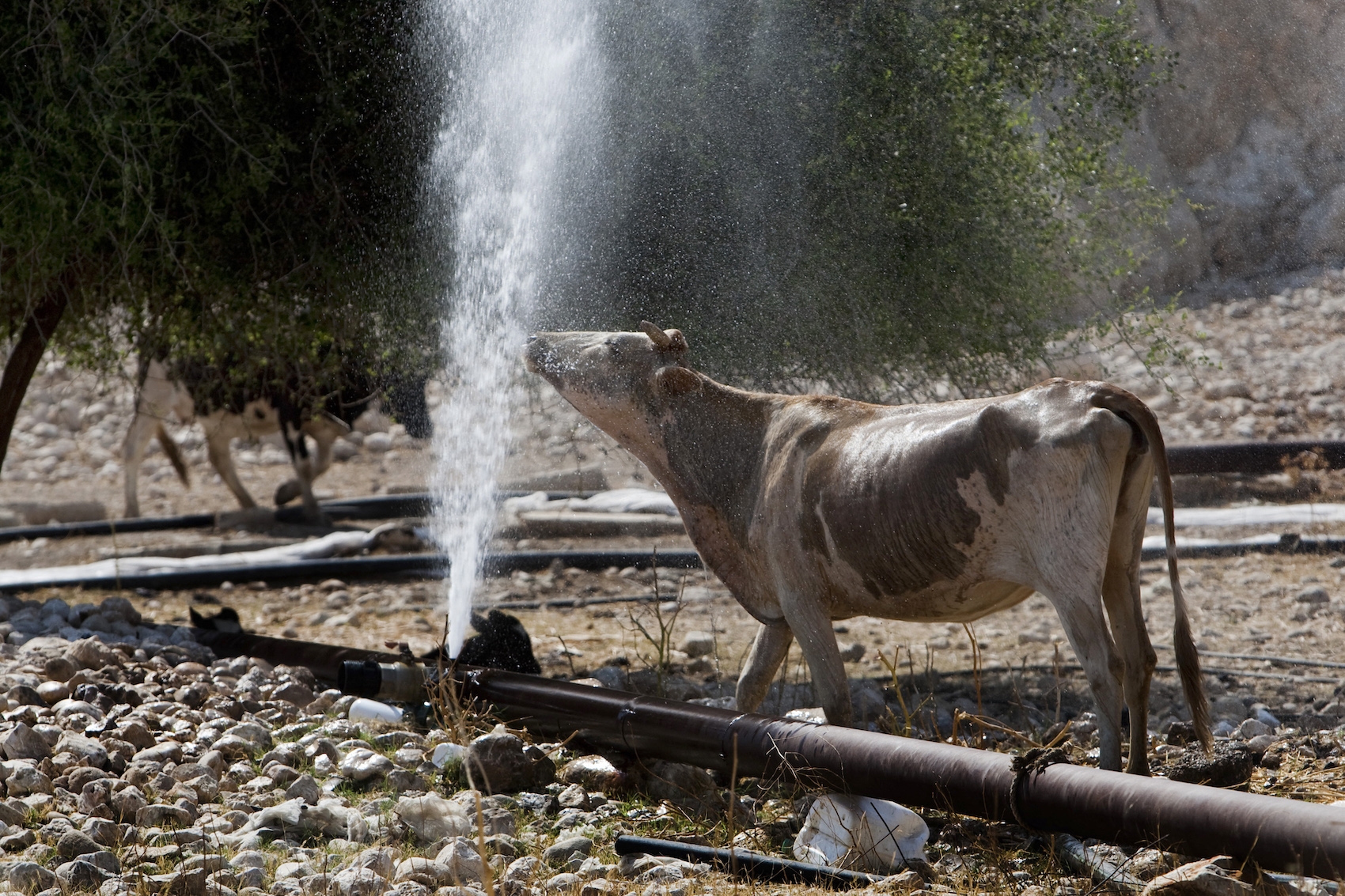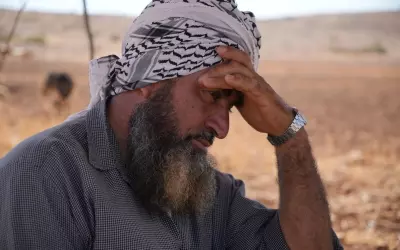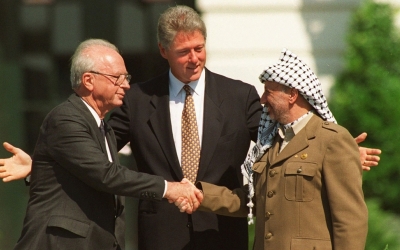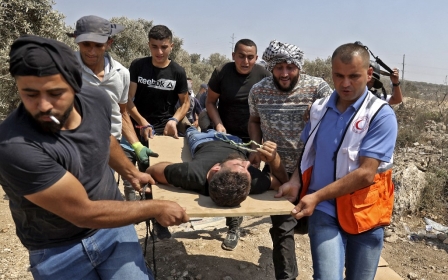Palestinians fight for right to water, survival in Jordan Valley

On 15 July, residents of Faroush Beit Dajan in the northern Jordan Valley woke up to a horrifying reality: the Israeli army had raided the village and demolished a seven-year-old water cistern that supplied water to their farms.
The demolition was part of an Israeli army campaign over the summer to destroy water sources that Palestinians had established in the Jordan valley, including water cisterns, ponds, wells for collecting water, and irrigation networks.
As a result of the destruction, some 85 Palestinian families have been struggling to find water to feed their summer crops, which extend over 480 dunams (48 hectares) of land.
'We must confront this cancer [settlers' violations], which is spreading in a wide and deep manner, but we cannot do it alone as farmers'
- Fathi Alayan Daraghmeh, Palestinian farmer
Many residents believe that the army, by targeting their water supply, had a larger objective, which was to pressure them into leaving the area.
"The [Israeli] occupation specifically targets the infrastructure of Palestinian agriculture, which 99 percent of the village residents depend on for their livelihoods," Azem Hajj Mohammad, head of the village local council, told Middle East Eye (MEE).
New MEE newsletter: Jerusalem Dispatch
Sign up to get the latest insights and analysis on Israel-Palestine, alongside Turkey Unpacked and other MEE newsletters
"That is why it constantly demolishes water tanks, irrigation networks, water lines, and seizes springs and water sources, with the aim of displacing Palestinians and replacing them with Israelis."
Such a policy is defined by rights groups as creating a "coercive environment" that could lead to forcible transfer, a war crime under international law.
‘Unlawful demolition'
According to Hajj Mohammad, the army demolished the cistern while a case was still being heard in the courts and before a final decision had been issued.
Seven years ago, during the construction of the water cistern, the Israeli occupation army presented the villagers with a stop-work order, but the families went to the Israeli high court, which issued a precautionary decision not to demolish, he said.
The cistern had a capacity of 500 cubic metres, which would supply their 48 hectares of crops.
Over time, residents began to rely increasingly on the water cistern after the village lost its main water source, the Fara'a irrigation project, which had collected water from the Ain Shibli and Ain Miska springs as well as other small springs in the area.
"We lost this source of water due to the repeated Israeli violations, including withdrawing huge amounts of water from the area and drilling deep wells, leading to a decline in the quantity of water we could depend on," said Hajj Mohammad
Differential treatment for settlers
In the area of Ain al-Hilweh, in the northern Jordan Valley, locals say they have learned to live with the violations perpetrated by the settlers.
Farmer Fathi Alayan Daraghmeh told MEE that since March he has been unable to take his livestock to drink at the spring, which lies 1km from his home.
Instead, he began purchasing water daily, both for his family's domestic use and for his cattle.
"I face the settlers on my own on a daily basis, and I try to retrieve the water from them. I face death threats, but I never pay any mind to them," Fathi said.
"Either I go on with my life, preserving my dignity and my family, or I die while working to regain our dignity and our right to live on our lands."
In late July, and after Palestinian protests against their repeated attempts to disrupt water supplies, Israeli settlers forcefully took over the main water spring there and turned it into a swimming pool.
Fathi accuses the Palestinian Authority (PA) of not doing enough for the occupied Jordan Valley, especially Ain al-Hilweh, which he said had led to the settlers’ takeover of the main water supply.
"We sent many appeals to the PA and asked them to strengthen the Palestinian presence in the region by sending delegations and directing Palestinian trips to the spring, but there was no response to our calls," he said.
Fathi owns a farm rearing about 500 cows, and he has been directly dependent on the spring for his livestock since his family settled in the area more than 50 years ago.
"[Israeli authorities] confined us in our livestock grazing areas and are now preventing our livestock from grazing there. In contrast, they make it easier for settlers to set up farms in the area and also build the necessary infrastructure for them," he told MEE.
He is now forced to spend 200-Israeli-new-shekel ($62) to purchase a water tank every four days for his family, while his livestock needs $6,215 worth of water per month, which is an exorbitant amount for him as a farmer.
"We transport water secretly, and then face checks by the Israeli police, who impose fines on us for doing so. They also confiscate our water tanks and the tractors that are used to transport the water.
'We, as Palestinian farmers, cannot withstand these Israeli attacks any longer. We need someone to stand with us and compensate us for what we lose on a daily basis'
- Samer Sawafta, Palestinian farmer
"They are trying to restrict us by all means."
Samer Sawafta, a farmer from the village of Bardala, says he built a 500-cubic-metre pond to gather water during the winter months to water his three-hectare plot of vegetable crops.
"The water pond was the only option that would enable us to continue cultivating our farm," Sawafta told MEE. "We suffer greatly from being denied access to water. Today we are going through a disaster, and our lives can no longer be tolerated, due to non-stop Israeli aggressions.
"We, as Palestinian farmers, cannot withstand these Israeli attacks any longer. We need someone to stand with us and compensate us for what we lose on a daily basis," he added.
According to Fathi, the situation in the Jordan Valley is worsening due to the Israeli occupation's policies, all related to settlement expansion and strengthening the army's presence in the strategic area.
Palestinian farmers no longer know whether they can withstand these measures, which are taking away their most basic rights, he said.
"In reality, we are in the process of completely losing the Jordan Valley. We must confront this cancer, which is spreading in a wide and deep manner, but we cannot do it alone as farmers; we need a force that will stand with us and defend our lands with us," Fathi told MEE.
Oslo Accords restrictions
Moayad Bisharat, director of programmes and projects at the Union of Agricultural Work Committees, told MEE that Israeli occupation authorities have demolished 15 Palestinian water pools since the start of the summer, in addition to destroying 2-3km of water lines.
"This year we are witnessing a large escalation in the Israeli targeting of the water sector, in contrast to previous years, when attacks were concentrated on Palestinian communities," said Bisharat.
He said that the main water problem in the Jordan Valley for the Palestinians was that the Israeli authorities were preventing residents from digging deeper wells, causing the existing shallow wells to have high salinity.
According to the Oslo Accords, Palestinians are prevented from digging wells, or even rehabilitating and repairing them, or deepening them, while Israeli authorities have control over 87% of the water resources, managed by the Israeli company Mekorot.
The Oslo Accords not only deprive Palestinians of exploiting their own groundwater, but also surface water, Bisharat said.
While water runs through dozens of valleys in the winter, the Israeli occupation prevents Palestinians from collecting and benefiting from it.
He added that many springs have dried up after settlers dug deep wells around them. The primary example is the al-Auja spring, which once produced about 3-6 million cubic meters annually, and was used by farmers to irrigate about 600 hectares in the area of Al-Auja.
Settlers built three wells around the spring in the 1990s, which led to it drying up and the desertification of large parts of the area.
To gain full control over water resources in the Jordan Valley, the Israeli occupation is now resorting to persecuting farmers when they break the rules and transport water to their communities and farms, according to Bisharat.
This, he said, indicates a continuous intent to displace Palestinians from the Jordan Valley.
Middle East Eye delivers independent and unrivalled coverage and analysis of the Middle East, North Africa and beyond. To learn more about republishing this content and the associated fees, please fill out this form. More about MEE can be found here.






